**教育 成功热线:
语法专项:
Be动词(am/is/are)的用法
1. (am/is/are)用来说明现在的状态。
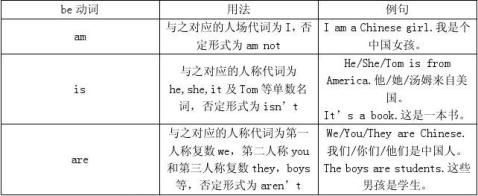

2. be 动词后所跟的成分
3. be动词常用缩略形式
I’m=I am you’re=you are we’re=we are he’s=he is she’s=she is it’s=it is
they’re=they are isn’t=is not aren’t=are not
that’s=that is there’s=there is there’re=there are my name’s=my name is
语法专练:
Ⅰ.专项填空
1. They Americans.
A. aren’t B. not C. isn’t D. be not
2. Sam and Helen in Class Three?
A. Is B. Are C. Isn’t D. Be
3.—Are you a new student? — , .
A. No; I am B. Yes; I’m not
C. Yes; I am D. Yes; I’m
4.—What your favourite food ? —Meat.
A. are B. is C. am D. be
5. You and she both students.
1
**教育 成功热线:
A. be B. is C. are D. am
Ⅱ.用be动词完成句子 6. This a banana and that an apple.
7. —What your name ?
—I Sandra.
8. —Where your shoes ?
—They on the sofa. 9. Here my English books, but where my notebook?
10.— Sally in the room?
—Yes, she .
语法专项:
指示代词
英语中常见的指示代词有 this,that,these,those,such,same 等。
(1) this (复数形式是these),是指时间或空间上离说话人较近的人或物;that(复数
形式是those),是指在时间或空间上离说话人较远的人或物。
This is Mr. Smith and that is Mr. Black. 这位是史密斯先生,那位是布莱克先生。 These are jeeps. Those are trucks. 这些是吉普车。那些是载重卡车。
(2) that/those 有时用来代替前面说过的名词,以避免重复。
The weather in Shanghai is not so cold as that (=the weather) in Beijing. 上海的天气没有背景那么冷。
【友情提示】
(1) 在电话用语中,that 相当于“你”,用于询问对方的身份;this 相当于“我”,常
用于自我介绍。
—Is that Mary speaking? 你是玛丽吗?
—Yes. Who’s that? 是的。你是谁呀?
—This is Ann. 我是安。
(2) 在疑问句中,如果句子的主语是this,that,these 或those 时,回答时用it代替
this,that;用they代替these,those。
—Is that your chair? 那是你的椅子吗?
—Yes,it is. 是的,是我的。
—What are these?这些是什么?
—They are oranges. 是橘子。
语法专练:
Ⅰ.单项填空
1.—Look!What’s in the sky?
—It looks like a kite.
A. this B. that C. these D. those
2.—Hello, who’s that?
— is Daming.
A. This B. That C. I D. Me
2
**教育 成功热线:
3.—Hi, Tony. Who’s this man?
— is my brother.
A. This B. That C. He D. She
4.—Are these your cousins?
—No, are my classmates.
A. they B. these C. she D. he 5. Tom and Mike are good friends. often help each other.
A. They B. Them C. Their D. Theirs 6. is the photo of my family. The old man is grandpa.
A. He; my B. This; my C. those; I D. That; I
Ⅱ.句型转换
7.This is a new classroom(变为复数) new classrooms.
8. That isn’t a big bus. (变为复数) big .
9. Those are some flowers. (变为单数) a .
10.—Are these your friends?(否定回答)
—No, .
there be 句型及表示地点的介词(短语)的用法
一、 there be 句型的用法
1. there be 句型的基本结构
there be 句型的基本结构:There be+主语+介词短语。其中there本身无词义;be是谓语动词。There be 结构表示一种存在关系,通常带一个地点状语,意思是“某地有······”。 There is a picture on the wall.墙上有一幅画。
2. there be 句型中be的两种变化情况
(1) 该句型中只有一个主语时,当主语是可数名词单数或不可数名词时,be动词用单数;
当主语是可数名词复数时,be动词用复数。
There is some milk in the glass. 杯子里有些牛奶。
There are many students on the playground.操场上有许多学生。
(2)该句型中有两个或两个以上并列主语时,则按“就近原则”,即谓语动词be与最靠近它的主语在“数”上保持一致。
There is a desk and two chairs in my bedroom.
我的卧室里有一张桌子和两把椅子。
There are five women and a child in the bedroom.
房间里有5位妇女和一个小孩。
3. there be 句型的两种否定形式
(1) 在be动词后加否定词not,句子中如果有some,则将其改为any。
There are some books on the desk.→There are not any books on the desk.
(2) 在be动词后加no。
There are some teachers in the office.→There are no teachers in the office.
4. there be 句型的一般疑问句
(1)there be 句型边一般疑问句时,将be动词提前到句首,some改为any。
3
**教育 成功热线:
There are some kites in the sky.→Are there any kites in the sky?
(2)回答时,用“Yes,there+be动词./No,there+be动词+not.”但不可与have混用。 试比较:—Is there a pencil box on the desk?
—Yes, there has./No, there hasn’t.(误)
—Yes, there is./No, there isn’t
二、 表示地点的介词(短语)的用法
1. 表示地点的介词(短语)有:on,in, at, behind, in the front of, in frond of, next
to, near等。它们和后面的名词共同构成介词短语,在句中可作地点状语、表语、后置定语等。
Tom is watching TV at home. 汤姆正在家里看电视。(地点状语)
The students are in the classroom now. 学生们现在在教室里。(表语)
The book on the desk is Tom’s. 桌子上的那本书是汤姆的。
2. 对作状语或表语的介词短语提问时,用疑问词where;对作后置定语的介词短语提问时,
用“疑问词which+名词”。 They are singing behind the tree.他们正在树后面唱歌。(地点状语)
→Where are they singing?他们正在哪里唱歌? The book is on the desk.书在课桌上。(作表语)
→Where is the book?书在哪里? The girl behind the tree is my younger sister.树后面的那个女孩是我妹妹。 →Which girl is your younger sister?哪个女孩是你妹妹?
语法专练:
单项填空 1. There some food, milk and fruit in the fridge.
A. is B. are C. has D. have
2. There aren’t computers in my classroom.
A. a B. an C. some D. any 3. The cat is the table, so we can’t see it.
A. behind B. on C. before D. over
4.—What’s in the picture?
— a teacher and some students.
A. There are B. There is C. These are D. This is
5.—Are there any chairs in the room?
—No, .
A. there aren’t B. there are C. there isn’t D. there is 6. there any apples on the desk?
A. Is B. Am C. Are D. Be 7. There a pen, two pencils and three rulers on the desk.
A. is B. am C. are D. be
8.—Is there a book in your bag?
— .
A. Yes, it is B. Yes, there is
C. No, there is D. No, it isn’t 9. Are there English books in your school library?
4
**教育 成功热线:
A. a B. an C. some D. any
语法专项:
have/has got 的用法
1. 如果表示“某人有某物”要用sb. have/has got sth
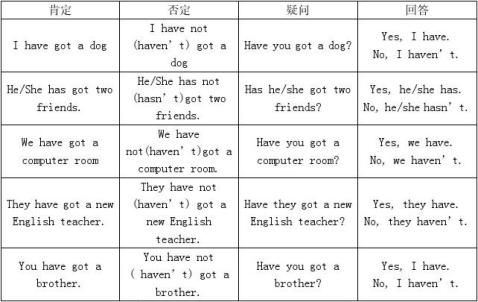
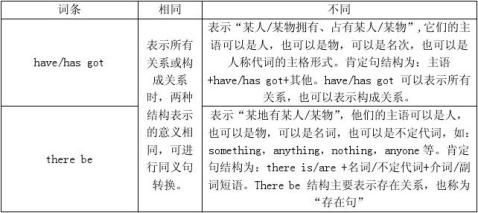
注:have not 可以缩写为haven’t, has not 可以缩写为hasn’t。 2. have/has got 与 there be “有区别”
同学们,我们已经学习了have/has got 与 there be 结构,它们都表示“有”。可是,你们知道他们的区别吗?
I have got a new bag.我有一个新书包。
He has got an elder brother.他有一个哥哥。
There are many desks and chairs in the classroom.教室里有许多桌椅。
5
**教育 成功热线:
There is someone at the school gate.有人在校门口。
A week has seven days. =There are seven days in a week.1周有七天。
语法专练:
Ⅰ.单项填空
1.— Mary got a sister?
—Yes, she has.
A. Have B. Does C. Do D. Has
2. I’ve got two uncles, but Tony got any uncles.
A. haven’t B. doesn’t C. don’t D. hasn’t 3. There some old people taking a walk in the park.
A. is B. are C. has D. have
4. —How many children in the picture?
—Three.
A. has B. is there C. have D. are there Ⅱ.用 there be 的适当形式或have/has got 填空 5. many pencils in her case. 6. some birds in the tree. 7. He some beautiful flowers. 8. Gina two brothers. 9. Daming any aunts? 10. a cat and a hat under the chair.
语法专项:
一般现在时
1.一般现在时的用法
(1)一般现在时态常用来表示经常或反复发生的动作或存在的状态。
I do my homework in the evening. 我在晚上做家庭作业。
We have lunch at school. 我们在学校吃午饭。
(2)一般现在时态还用来表示普遍存在的真理或客观事实。
The earth moves round the sun. 地球绕着太阳转。
(3)有些表示状态和感觉的动词,如:be, love, like, look(看起来), think(认为)等,通常不用现在进行时态,而用一般现在时态。
What do you think of it? 你认为它怎么样?
(4)有些表示短暂动作的动词,如:be, begin, come, leave, start 等,常用一般现在时态表示按计划或安排将要发生的动作。
Tomorrow is Sunday. 明天是星期天。
The train leaves at 12:15. 火车12点15分开。
2.一般现在时的构成
(1)be 动词 句子的谓语动词只有be(am, is, are)。否定句要在 am, is, are 后加not, is 与 are 常与 not 缩写成 isn’t 和 aren’t。
We are students. 我们是学生。
I’m not a worker. 我不是一名工人。
6
**教育 成功热线:
(2)祈使句 无论是肯定祈使句还是否定祈使句,都用一般现在时态。
Let’s go to school. 我们去上学吧。
Don’t read in the sun. 不要在阳光下读书。
(3)情态动词 句子的谓语动词由“情态动词+动词原形”构成。
He can read and write now. 他现在会读会写了。
(4)实义动词 句子的谓语动词是实义动词,除第三人称单数外均用动词原形。否定句中,动词由“don’t(do not)+实义动词”构成(主语为第三人称单数时除外)。 I get up at five thirty in the morning. 我早上5点起床。
We don’t go to work on Sundays. 我们星期天不上班。
语法专练:
Ⅰ.单项填空 1. Jim and Sam go to school by bus.
A. go B. to go C. goes D. going 2. He his work at 7:00.
A. start does B. starts to do
C. starts do C. start to do 3. What you for lunch?
A. do; have B. have; have
C. have; do D. does; have
Ⅱ.用括号内所给单词的正确形式填空 4. Sam, with Lucy and Jim, (have) lunch at school. 5. They (not go) to school at 8:00. 6. Sam always (get) up at six in the morning.
Ⅲ.单句改错
7. I am not go to school every day.
8. We playing basketball in the afternoon.
9. You are sing very well.
10. They not have dinner at home.
语法专项:
行为动词的一般现在时(1)
一般现在时表示经常性或习惯性的行为,常与 usually, often, always, sometimes, seldom, never 等连用。
She often goes out on Sundays. 星期天她经常出去。
1.主语是以下情形之一时,行为动词的一般现在时形式需有数的变化:
7
**教育 成功热线:
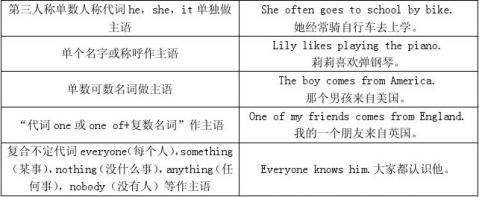
2.实义动词的一般现在时,主语为第三人称单数的肯定句变否定句时,须借助does,也就是在实义动词原形前加doesn’t。
Kitty works.基蒂工作。→Kitty doesn’t (does not) work. 基蒂不工作。
变疑问句也须借助does,即在句首加Does,而实义动词用原形。
Sam speaks English. 萨姆说英语。→Does Sam speak English?萨姆说英语吗? 回答这类问句时,通常使用简略形式,无需再出现实义动词。
肯定句:Yes,主格代词+does.否定句:No,主格代词+doesn’t.
The tiger only lives in Asia. 老虎仅生活在亚洲。 一般疑问句:Does the tiger only live in Asia?老虎仅生活在亚洲吗?
肯定回答:Yes, it does.是的,它只生活在亚洲。
否定回答:No, it doesn’t. 不,它不仅仅生活在亚洲。
3. 使用一般现在时容易出现的错误。
① 忘记将实义动词变成第三人称单数形式。
My mother usually go (goes) shopping on Sundays.
我母亲通常在星期天去购物。
② 错写动词第三人称单数形式。
She watchs (watches) TV in the evening.她晚上看电视。
③ 误将助动词do/does看做实义动词
My elder brother doesn’t his homework.我哥哥不做家庭作业。
有些固定短语中含有do,如:do some shopping(购物),do one’s homework(做家庭作业),do some reading(读点东西)等,极易将do误用。
上句的正确表达为:My elder brother doesn’t do his homework.
④ 忘记使用一般现在时。
Sometimes she is helping (helps) he mum with the housework.
有时,她帮她妈妈做家务。
语法专练:
Ⅰ.单项填空
1. A large number of students in this school from the country. They work very hard.
A. come B. comes C. came D. coming
2. — does your elder brother for lunch?
8
**教育 成功热线:
—Rice and meat.
A. What; have B. What; has C. How; have 3. My little sister pandas very much.
A. like B. likes C. is like 4. My mother snakes. She says they are ugly.
A. not like B. doesn’t likes C. doesn’t like D. don’t like 5. Jenny blue trousers on school days.
A. wear B. wearing C. wears D. wore
Ⅱ.选词填空
wear,play,get,talk,do
6. Mary doesn’t her homework on Saturday evening. 7. Jenny always a pair of glasses. 8. He always to his mother after dinner. 9. Tony never computer games. 10. The girl to school by bike.
语法专项:
行为动词的一般现在时(2)
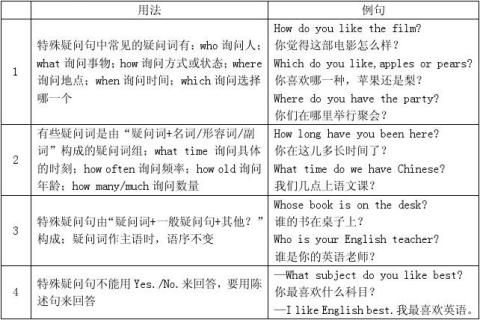
【友情提示】
学习特殊疑问句要注意两点:
1.语序:特殊疑问句的语序与一般疑问句一样,用疑问语序。
2.疑问词:要根据所提问的内容而选择适当的疑问词。疑问词总是放在句首。 9
**教育 成功热线:
语法专练:
Ⅰ.单项填空
1.—Excuse me, is Mr Green’s office?
—It’s over there.
A. when B. where C. what D. which
2.— do you think of the new book?
—It’s a bit hard.
A. How B. What C. Which D. Who
3.—The blue jacket looks nice on you. is it?
—It’s 50 dollars.
A. How many B. How much C. How long D. How often
4.— do they like to study?
—They like to study in groups.
A. When B. Why C. How D. Where
5.—Peter, do you visit your grandparents?
—Twice a month.
A. how long B. how soon C. how far D. how often
Ⅱ.按要求改写句子就划线部分提问 6.I write three or four emails every week. you write every week? 7.The girl in the room is Lucy. girl is Lucy. 8.I usually use the computer to do my homework. you usually the computer to ? 9.You can write the name in the box. I write the name? 10.I go to school by bike. you go to school?
语法专项:
行为动词的一般现在时(3)
频度副词
一般现在时中,表示经常性或习惯性的行为时,常常使用频度副词。常用的频度副词有:
1. always 是频度最大的词,意为“总是;永远”。
He always comes home early. 他总是很早回家。
2. usually 意为“通常”,即很少例外,频度仅次于always.
When do you usually have breakfast? 你通常什么时候早饭?
3. often 意为“经常”,在频度上不如 usually 那么频繁。
Li Ping often asks strange questions. 李平经常问奇怪的问题。
4. sometimes 意为“有时候”,频度比often小,表示动作偶尔发生,间隔时间较长。 Sometimes I watch TV in the evening. 晚上我有时看看电视。
5. seldom 意为“很少,不常”,频度极低。
10
**教育 成功热线:
His father seldom plays basketball with him.
他父亲很少和他一起打篮球。
6. never 意为“从不,决不”,频度等于零。
My parents have never been abroad. 我父母从未出过国。
语法专练:
Ⅰ.根据汉语完成句子
1.有时我骑自行车去上学。 I to school bike
2.我通常六点起床。 I at six.
3.妈妈从不做生日蛋糕。 Mum a cake.
4.我弟弟不经常听音乐。 My brother music.
5.你经常受到生日礼物吗? you birthday ?
Ⅱ.根据要求改写句子
6.He always likes table tennis.(改为否定句) He table tennis.
7.Lucy does her homework every day.(改为否定句) Lucy her homework every day.
8.He has lots of clothes.(改为同义句) He has of clothes.
9.He often watches football.(改为一般疑问句,并作否定回答)
— football?
— ,he .
10.He goes to football matches on Saturday.(把usually放到句中) to football on Saturday.
语法专项:
现在进行时
1.意义:现在进行表示现在或现阶段正在进行的动作或存在的状态。
2.构成:be+现在分词。be有人称和数的变化,即I(我)用am;you(你/你们)用are;he,she,it(第三人称单数)用is;复数全用are。
We’re having an English class now.我们现在正在上英语课。
They’re talking.我们正在谈话。
He is doing well at shool.他在学校学习很好。
3.动词的现在分词构成的几种方法:
现在分词构成法:
① 一般在词尾直接加-ing。
11
**教育 成功热线:
eat-eating drink-drinking go-going
think-thinking read-reading look-looking
② 以不发声的字母e结尾的动词,去掉e再加-ing。
come-coming write-writing take-taking
give-giving make-making close-closing
③ 以重读闭音节结尾且末尾只有一个辅音字母的动词,应先双写这个辅音字母再加-ing。
run-running get-getting put-putting
cut-cutting sit-sitting begin-beginning
④ 以ie结尾的动词,先将ie变为y,再加-ing。
lie-lying die-dying tie-tying
4.现在进行时的句式:
① 肯定句:主语+be(am,is,are)+现在分词+其他。
He is doing his homework now.他现在正在做作业。
② 否定句:主语+be(am,is,are)+not+现在分词+其他。
They’re not playing football.They’re playing basketball.
他们不是在踢足球。他们正在打篮球。
③ 一般疑问句:Be(Am,Is,Are)+主语+现在分词+其他?
—Are you having a party?你们正在聚会吗?
—Yes,we are.是的,我们正在聚会。/No,we aren’t.不,我们没有。
巧学妙记:
主语在首句,am,is,are跟在后面,现在分词跟着走,其他成分不能丢。 表示动作在进行,句中now把时间定。一般问句这样变,把be提到主语前。 否定句式更简单,be后再把not添。
语法专练:
I.单项填空
1.Listen,our teachers_____Red Songs in the next room.
A.sang B.are singing C.sings
2.Mary isn’t here at the moment.She_____later.
A.comes B.came C.is coming D.is coming
3.Roy is_____a postcard_____his friend.
A.sending;to B.buying;to C.taking;for D.giving;for
4.One of the girls_____standing by the lake.
A.are B.is C.am D.be
Ⅱ.写出下列动词的现在分词形式
5.visit______ 6.come______ 7.make______ 8.leave______
9. work______ 10.run______ 11.get______ 12.put______
13.see______ 14.lie______ 15.swim________
12
